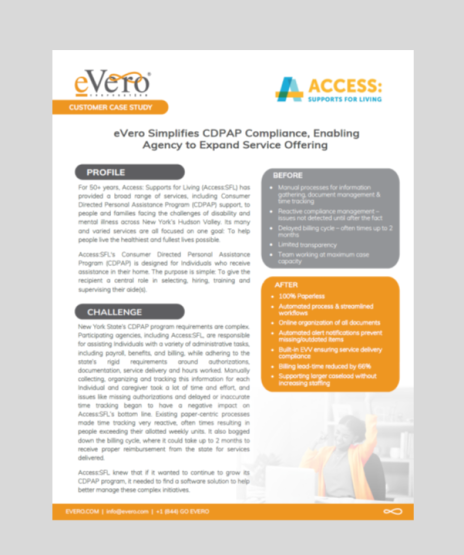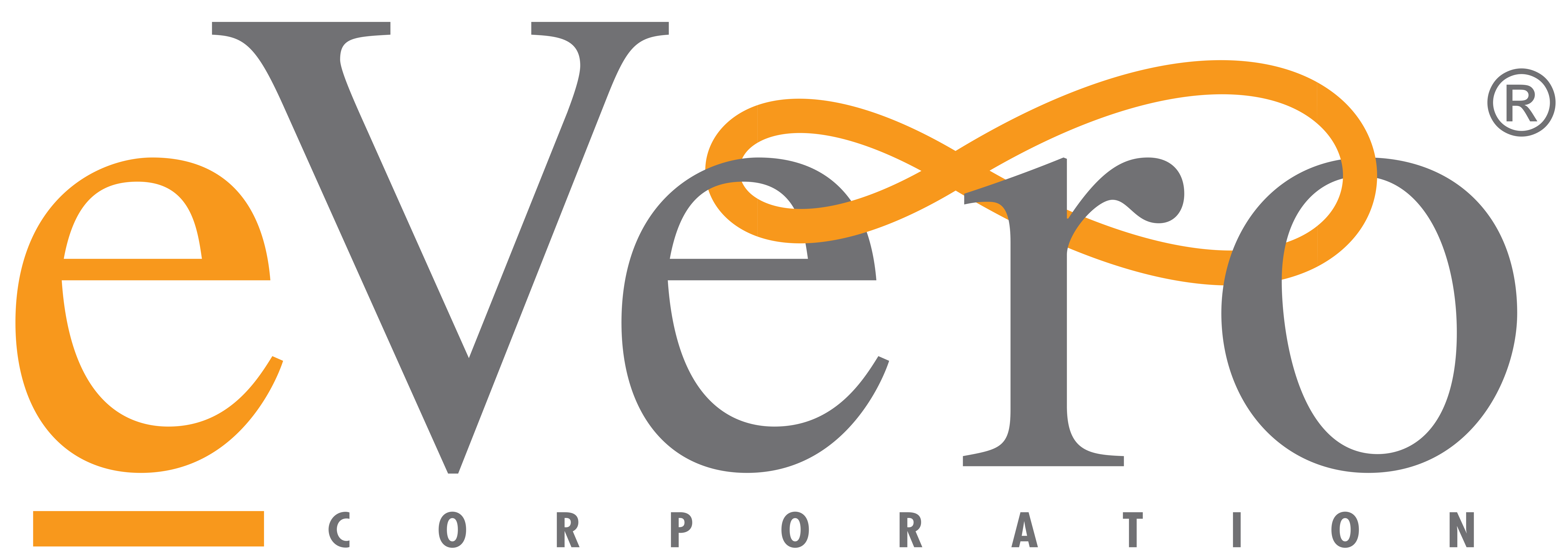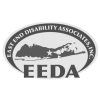A win-win for care recipients and caregivers.
Care from someone you know and trust is invaluable. Personal Care Service initiatives, such as the Consumer Directed Personal Assistance Program (CDPAP), take that to heart by offering a way for people with intellectual and developmental disabilities to receive in-home services, such as daily living (ADLs) or Instrumental Activities of Daily Living (IADLs), from someone they like and trust instead of a stranger. Best of all, these chosen providers get compensated for their time and services. It’s a win-win for all involved, but there are some important program requirements and responsibilities that participants need to be aware of and continually manage. That’s where eVero can help.

Empowering those who care for you.
Consumer-directed care programs offer Individuals flexibility and freedom to hand-select their caregivers (also referred to as personal assistants or attendants), but they also require a new layer of management responsibility. This means Individuals are hiring, scheduling, recruiting, training, supervising, and if the need arises, terminating caregivers. Individuals receiving services must also maintain active program authorization, health assessment, and caregiver documentation, and track and approve hours worked by caregivers weekly. It’s challenging, but with the right resources, navigating the complexities doesn’t have to be that complicated.
Individuals work with Fiscal Intermediaries (FI) or Agencies to help them navigate Personal Care Service program requirements, and act as liaisons between care recipients, caregivers, and the paying party – whether it’s Medicaid, a Managed Care Organization (MCO), or an insurance company. eVero’s technology solutions empower these FIs and Agencies to more easily and centrally manage these program requirements and simplify tasks like enrollment, the hiring process, and caregiver payroll and benefits management.

Enabling better so you can be at your best.
digitalAGENCY (dA), a software module within the eVero platform, creates a digital ecosystem that connects Individuals, Fiscal Intermediaries, and caregivers, enabling them to easily share information and efficiently manage the administrative requirements of Personal Care Service programs.
Here’s how eVero can help FIs and Agencies with consumer-directed programs:
- Simplified Online Management – Track and approve hours worked in real time. eVero’s dA web portal and mobile app streamline data capture and service documentation for FI’s, Agencies, and caregivers.
- Documentation Compliance – Get easy access to digital versions of required documents. They are organized in ‘Document Trees’ and provide active authorization forms for both Individuals and Caregivers.
- Authorized Time Tracking – Safeguard against non-reimbursable overages with online monitoring of hours worked and remaining hours, by Individual and Caregiver.

- Compliance & Audits – Be audit-ready with built-in Electronic Visit Verification (EVV). Data captures including clock-in, clock-out, and GPS location are all automatically collected by the eVero mobile app at the point of service.
- Fraud Prevention – Accurately document the proper amount of authorized services that are provided each week. Be confident that caregivers are providing these services where and when they are supposed to be with EVV data verification.
- Real-time Metrics – Stay informed with data and insights. Portal dashboards can be customized to fit specific needs, and logins can be set up with role-based security for access control from anywhere.
- Accelerated Revenue Cycle – Get paid faster. Timesheets are submitted and approved online, expediting claim creation and submission resulting in faster reimbursement timeframes.

Case Study
Agency simplifies CDPAP compliance and expands service offerings with eVero.
Before eVero, this upstate New York agency was working at maximum case capacity just to stay in compliance with the State’s stringent CDPAP service documentation and authorization requirements.
After implementing eVero they were able to create automated alerts to prevent missing documents, support a bigger caseload without increasing staff, and dramatically reduce their billing lead time.
Download the case study to learn the details!











